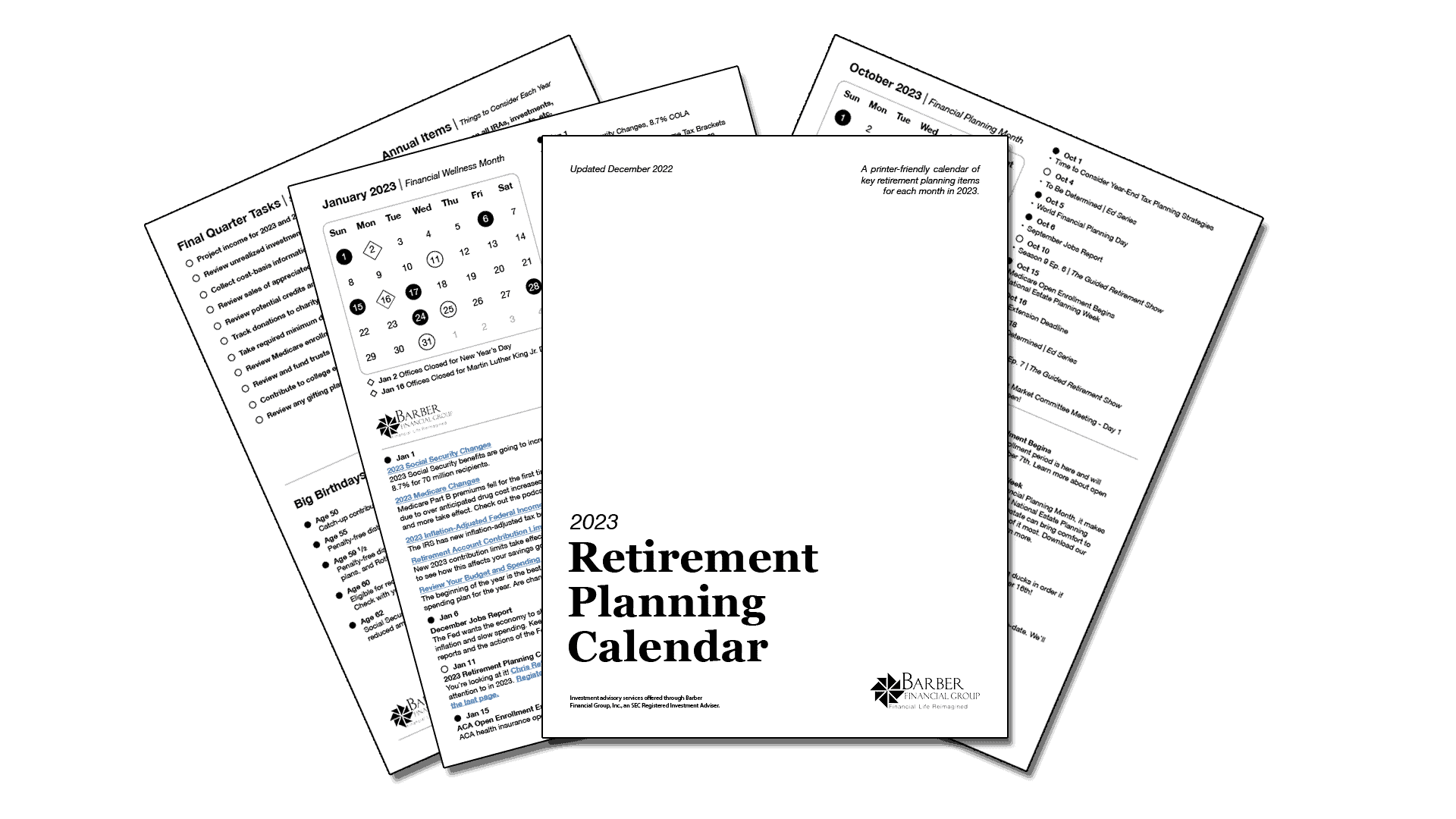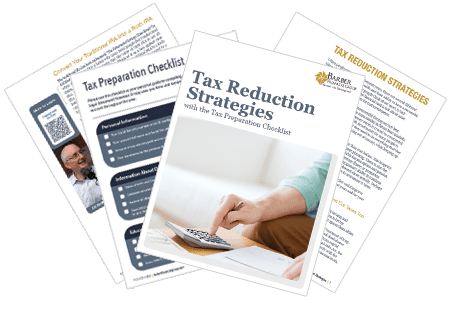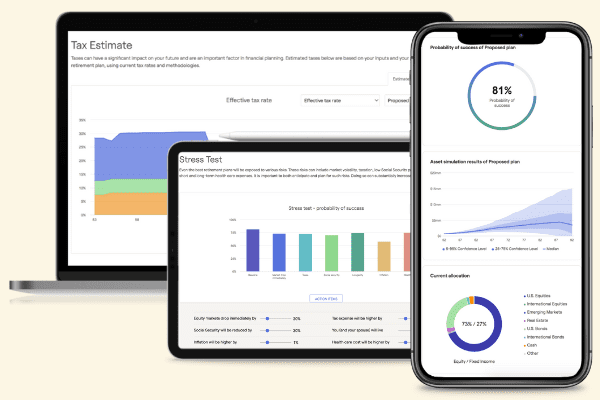Financial Planning Tips for 2023
Key Points – Financial Planning Tips for 2023
- Kicking Off the New Year by Reviewing Your Financial Plan
- Accounting for Inflation
- It’s a Good Time to Do Some Tax Planning
- Reviewing Beneficiaries and Insurance Coverages
- What Is There to Know About SECURE 2.0?
- 7 Minutes to Read | 10 Minutes to Listen
Financial Planning Tips for 2023
It’s hard to believe that we’re almost through the first month of the year, but if there’s one thing we learned from the volatility we experienced in 2022, it’s that forward-looking financial planning is pivotal. So, as we look ahead to what the rest of this year could hold, Logan DeGraeve, CFP® shares some Financial Planning Tips for 2023.
Ringing in the New Year with Some Financial Planning Tips
After a rough year in the stock and bond markets in 2022, there are a lot of questions what’s in store for the balance of 2023. While we don’t have a crystal ball to tell you exactly what will happen, we can make some educated guesses and plan for many different outcomes so that you’re well prepared from a financial perspective. For our second Modern Wealth Management Educational Series event of the year, Logan DeGraeve will share some financial planning tips for 2023.
But before we run through those financial planning tips, we want to make sure you’re organized financially for 2023. If you haven’t already, we hope that you’ll download our 2023 Retirement Planning Calendar. It’s filled with important dates and events that you need to be aware of that can impact your retirement. Download your copy of the 2023 Retirement Planning Calendar below.

2023 Retirement Planning Calendar
The Most Important Financial Planning Tip: Reviewing Your Financial Plan
No matter what economic conditions we’re experiencing, the most important financial planning tip will never change. Our first financial planning tip for 2023 is to review your financial plan.
“You need to understand how what happened in 2022 impacted you. Obviously, it was a tough year in the stock and bond markets. We want to make sure that you’re still on track for the goals that you’ve laid out. And have your goals changed?” – Logan DeGraeve
Your goals for retirement are one of many important things that retirement calculators don’t factor into your retirement planning. As we build people’s financial plans through our Guided Retirement System, we ask them about their retirement goals. What’s the point of planning for retirement if you’re not going to live life the way you want to? Your retirement plan isn’t complete without your goals.
One of the reasons that reviewing your financial plan is our No. 1 financial planning tip is because your goals will change over time. Whether you’re wanting to travel more, help with funding your grandchildren’s educations, buy a second home—whatever it may be—you need to make sure to meet with your financial advisor to make sure your plan accommodates for your goals.
Knowing How Your Investments Are Positioned
With all the market volatility we’ve experienced over the past 12 to 18 months, you need to review how your investments are positioned. While it might sound like we’re stating the obvious, knowing what you own is critical. Are you exposed to the optimal amount of risk? If you’re not, how you are you going to position yourself if we see another significant market downturn in 2023?
That’s why we stress test financial plans against past economic cycles to see how the plan would hold up. Shane Barber has discussed why the history of the Great Recession and the Dot-Com Bubble remain relevant over the past year. Those are two periods that we oftentimes stress test plans against. If you’re unsure or uneasy about how you’re positioned, it’s probably time to meet with your advisor to walk through things and potentially rebalance.
“If you had substantial losses in stocks, bonds—whatever it may be—make sure that your 60-40 target stock-to-bond mix is still 60-40. You don’t want to get the allocation out of whack where it could take too long to recover and/or you could drop further. Stay within the drift parameters that you’ve set.” – Logan DeGraeve
Review Your Spending and Account for Inflation
When we meet with people for the first time to discuss planning for their retirement, some of them will have already started to build a financial plan. However, one problem that we’ve frequently seen over the years are plans that don’t properly account for inflation.
If your plan only had a 1% or 2% inflation rate applied to it prior to the economic downturn we’ve been experiencing, you might have been able to get away with it. This rampant inflation has shown how that strategy can quickly derail someone’s retirement.
It would be nice if we could control the Federal Reserve’s decisions as it tries to put an end to these high inflationary levels. However, inflation is something we can plan for. That’s our next financial planning tip for 2023. When we’re building a plan, we use roughly a 4% inflation rate for most expenses and a 6.5% inflation rate for things like health care costs and college expenses. It’s important to review your plan to make sure your plan is keeping up with inflation, all while allowing you to keep fulfilling your retirement goals.
Review Your Insurance Coverages
Speaking of health care costs, one of our other financial planning tips is reviewing your insurance coverages. It’s important to review your health insurance and Medicare coverages (yes, Medicare open enrollment has passed, but it never hurts to make sure everything is intact).
We’re not just talking about health insurance either. When is the last time you reviewed your property and casualty insurance? That needs to be reviewed each year.
Also, what about your life insurance? Do you still need the same amount of life insurance that you needed 10-15 years ago? It depends on your specific situation, but it’s always good to review things like that.
Reviewing Your Beneficiaries
One of the fun things about comprehensive financial planning is that it doesn’t just involve your retirement. It factors in your loved ones as well if you’re someone who wants to leave a legacy. That brings us to our next financial planning tip, which is reviewing your beneficiaries (or that you have them in the first place). If you’ve had changes in your family, you need to make sure your beneficiaries are up to date.
“You don’t need to review your estate plan every year, but it’s good to review it every few years. Review things like your trusts, powers of attorney, and health care directives. Make sure that the wishes you set forth three to five years ago are still what you would like to have today.” – Logan DeGreave
Tax Planning Is Always Among the Top Financial Planning Tips Every Year
We can’t rattle off too many financial planning tips for 2023 without mentioning tax planning. While January 24 does mark the first day of tax filling season, remember that tax compliance and tax planning aren’t one in the same. Tax planning involves looking at your income and determining what it’s going to be for 2023. To some degree, when you’re in retirement, it’s the first time that you can begin to manipulate your income sources. That can include things like Roth conversions, Qualified Charitable Distributions, and how you’re going to take Required Minimum Distributions. What bucket of money are you going to spend from?
“When you’re looking at tax planning and Roth conversion planning while the market is down like it is currently, it’s a good time to do this for the long haul. Don’t wait until October, November, and December to start tax planning. You don’t need to decide everything today or tomorrow, but you should get a general idea of what you want to do for 2023.” – Logan DeGraeve
Our Director of Tax, Corey Hulstein, reviewed those tax planning strategies and much more with Dean Barber last year for our Year-End Tax Planning for 2023 Modern Wealth Management Educational Series webinar. Even though we’ve turned the page to 2023, tax planning remains top of mind. We’ll continue to discuss tax planning throughout the year and encourage you to download a copy of our Tax Reduction Strategies Guide.

Download: Tax Reduction Strategies Guide
Reviewing Your Debt and Where You’re Borrowing from
As we transition to our next financial planning tip for 2023, let’s discuss debt and where you’re borrowing from. The cost of borrowing is substantially higher in 2023 than it was a year ago or at the beginning of the decade. If you have things like an adjustable rate mortgage, credit card debt, or home equity lines of credit, make sure you’re reviewing those terms and that they’re not adjusting on you. If you do have a debt problem, consolidate the highest interest things first.
Take Advantage of Higher Contribution Limits
One of our more exciting financial planning tips for 2023 is to take advantage of higher contribution limits. The 2022 contribution limit for 401(k)s, 403(b)s, and most 457 plans. That limit is now $22,500 for 2023. There’s also a $7,500 catch-up provision for those who are 50 or older. That creates an opportunity for someone who is 50 or older to put $30,000 into their employer plan in 2023.
“I wouldn’t just depend on your payroll service or employer if you’re telling them that you want to max out. Make sure that you’re looking at your paystub.” – Logan DeGraeve
There are also increased contribution limits for your IRAs in 2023. You can now contribute up to $6,500 in 2023 between your traditional or Roth IRAs. And for those who are 50 or older, that can increase to $7,500 following a $1,000 catch-up provision.
SECURE Act 2.0 and Your Retirement
As we round out our financial planning tips to begin 2023, we want to briefly touch on the SECURE Act 2.0 and how it impacts your retirement. One of the most significant changes involves something we touched on earlier: RMDs. The RMD age has moved from 72 to 73.
“Let’s be clear. The lucky ones are the folks who turn 72 in 2023. You don’t need to take that first distribution now. Make sure you’re taking that into account when you’re looking at your overall plan.” – Logan DeGraeve
There was one significant thing that SECURE 2.0 didn’t do, though. It failed to clear up any confusion on the beneficiaries and inherited IRAs. This is something you really need to pay attention to because there are penalties for missing RMDs for beneficiary IRAs.
Stay Tuned for More Financial Planning Tips Throughout 2023
There were quite a few financial planning tips that we threw at you all at once, but we hope you have found them to be helpful. And while we just reviewed several financial planning tips to start the year, we’ll be sharing many more with you throughout 2023.
If there’s just one financial planning tip that you take away from this, it should be the first one. It’s critical to review your financial plan if you haven’t done so recently. And if you don’t have a plan in place at all, now is the time to build one. We’re giving you the chance to do exactly that at no cost or obligation with our financial planning tool. You can begin building your plan today by clicking the “Start Planning” button below.
Whether you have questions over the financial planning tips we’ve reviewed or our financial planning tool, please don’t hesitate to reach out to us. You can ask your questions by scheduling a 20-minute “ask anything” session or complimentary consultation with one of our CERTIFIED FINANCIAL PLANNER™ professionals. We can meet with you in person, by phone, or virtually depending on what’s easiest for you.
Financial Planning Tips for 2023 | Watch Guide
Introduction: 00:00
Review Your Financial Plan: 00:16
Review Your Spending and Account for Inflation: 01:28
Review Beneficiaries on All of Your Accounts: 01:52
Start or Review Your Tax Planning Strategy in January: 02:20
Review Your Debt, Especially in 2023: 03:31
Review Your Investment Allocation and Portfolio Risk: 04:12
Take Advantage of Higher Contribution Limits: 06:19
Review Your Insurance Coverages: 07:33
SECURE Act 2.0 & Your Retirement: 08:00
Changes to the RMD Age Starting in 2023: 08:12
Conclusion: 09:02
Investment advisory services offered through Modern Wealth Management, Inc., an SEC Registered Investment Adviser.
The views expressed represent the opinion of Modern Wealth Management an SEC Registered Investment Advisor. Information provided is for illustrative purposes only and does not constitute investment, tax, or legal advice. Modern Wealth Management does not accept any liability for the use of the information discussed. Consult with a qualified financial, legal, or tax professional prior to taking any action.
